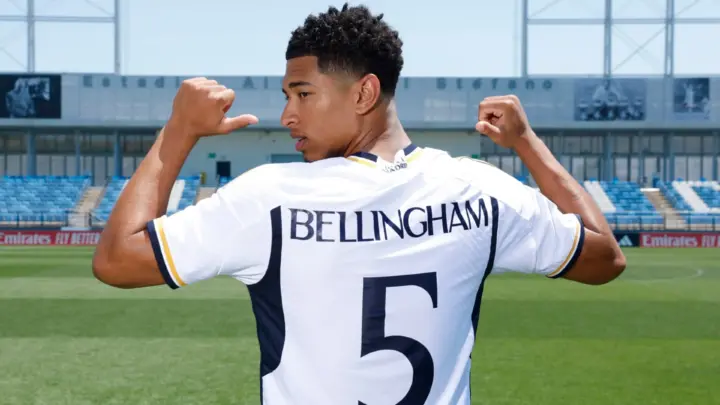England midfielder Jude Bellingham has spoken up about the negativity and scrutiny that athletes face on social media. He recently had his say while speaking to the press, and fans have been reacting.
According to him, he has had several moments of self-doubt while trying to maintain a macho image on and off the pitch, but now he realizes that there is a need for more openness about mental health in football.

Bellingham added that he no longer reads social media comments about himself to protect his sanity.
His words, “With the development of social media and technology, there are more ways to attack someone, to make them feel bad, and I think there’s still a stigma around talking about mental health,” the midfielder said, as quoted by Marca. “I know there have been times when I’ve felt vulnerable, doubted myself, and needed someone to talk to, but instead, I’ve tried to maintain that macho athlete image of ‘I don’t need anyone.’ The truth is, I do, just like everyone else. And you’ll feel so much better if you talk about your feelings and emotions.
As athletes, it seems like we have the world at our feet or in our hands: we can do whatever we want, make a lot of money, and never be affected by it. But the reality is that if we’re able to show our vulnerability, it opens up a broader dialogue for people struggling in the dark. It’s the duty of people like me, and those of us who hold these positions, to be role models.
I still think athletes are supposed to just shut up and take it easy, which is an outdated view. The love an athlete receives is extraordinary. But for every person or people who love you, there are others who despise you because of the team you play for or something you’ve done . That hate can be very hard on athletes, and I can truly empathize with those who struggle with mental health issues. Everyone has the right to their opinion about sports, but there should be limits to the horrible things that can be said . I’m not entirely sure how you can limit that on social media, but I think the support network around athletes is important.
When I was a young player in Birmingham, I used to type my name into Twitter and read everything that was said. But even if the comments were positive, I quickly decided: why should I let the opinions of people who don’t know me validate what I think about myself?
I believed I was a good player before reading it on Twitter, so what was the point of reading what other people were saying? Of course, if I came across negative comments, it would have the opposite effect. So, again, I asked myself: why am I putting that on my own mental health?”
There are aspects of social media that are very valuable for an athlete. More and more people are interacting with it, rather than with press conferences and TV interviews.
When you can be honest and authentic with fans, it gives them a very clear idea of how you felt during a match or in your everyday life. It helps you become more relatable. However, as I discovered when I was a young player, there’s also a negative element that I’ve now chosen to avoid, and I know many other athletes have too. There’s already enough negativity and pressure in professional sports without going out of my way to seek it out. Now, when I read negative comments, they don’t affect me, but I still prefer not to see them.
The most important thing is confidence: when you have it, you feel like you can handle it forever,” he added. “But when you don’t have it, you can feel lower than low, like your feet aren’t working, like your body isn’t functioning. I’m sure there are ways to try to regain confidence, but you basically get it from performance, so it’s almost a paradox.
I always try to keep my confidence high, whether through self-affirmation or accepting the fact that I’m not going to complete every pass, beat every player, or score and win every game. The more comfortable you are with that, the more comfortable you are with knowing that you’re not perfect.”
WOW.
Support InfoStride News' Credible Journalism: Only credible journalism can guarantee a fair, accountable and transparent society, including democracy and government. It involves a lot of efforts and money. We need your support. Click here to Donate
